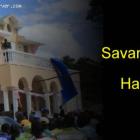ADVERTISEMENT
Duvalier Facts - Haiti Observer Blog
Duvalier Facts, Haiti Observer Blog. Read the following articles about Duvalier Facts
The Wedding of Jean Claude Duvalier and Michele Bennett
It was revealed that the two met in High school. However, the romantic relationship between Michele Bennett and Jean Claude Duvalier did not begin until ten years later. the wedding that was considered the biggest event of the time took place on May 27, 1980. The wedding was estimated to cost over US$3 million. The marriage also brought an underlining issue to the surface in the Haitian society. Many saw it as renewed symbol of alliance with the mulatto elite by the Duvalier regime. This was in direct contrast to the policy of Francois Duvalier who in 1957 was fighting against presidential candidate Louis Dejoie, a mulatto land-owner and industrialist from the north of Haiti. Francois Duvalier used used a Noiriste strategy to challenge the mulatto elite and appealed to the Afro-Haitian majority.
Following the wedding and the increased power gained by Michele Bennett as the new First Lady, new friction started to flair-up between her and her mother in law, Simone Duvalier.
Marie-Denise Duvalier
The oldest daughter of Francois Duvalier and Simone Ovide Duvalier, also sister of former Haitian Dictator, Jean-Claude Duvalier, Marie-Denise Duvalier has not been a popular figure. She has lived a quiet and very private life with her family.
I was reported that in April 1971, following the deat of her father Francois Duvalier, Marie-Denise Duvalier was one of the candidates who could have been the successor. Jean-Claude Duvalier fought hard not to become president. Instead, he made his preference known at the time that the presidency go to his older sister Marie-Denise Duvalier. This however did not fly well with the committee which his father's Interior Minister, Luckner Cambronne, was heading.
Jean Claude Duvalier, how he came into Power
Jean Claude Duvalier was born in the Capital City of Port-au-Prince, Haiti. He spent his academic life at Nouveau College Bird and Saint-Louis de Gonzague. Later, he studied law at the University of Haiti. one of his teacher was Gerard Gourgue.
In April 1971, Jean Claude became presidency of Haiti at the age of 19 upon the death of his father, becoming the world's youngest president.
It has been reported that Jean Claude Duvalier did not have any ambition to follow his father's footstep to become president. All this was an arrangement made made following the death of his father. He preferred at the time that the presidency position goes to go to his older sibling, Marie-Denise Duvalier. One of the most influential persons at the time was the interior Minister of Francois Duvalier, Luckner Cambronne convinced him to take on the role of President for Life
The Leopard Corps in Haiti During Jean Claude Duvalier Reign
During the Government of Jean-Claude Duvalier, he attempted to balance the power between the existing Armed forces and created as a result created a new military force, the Leopards Corps. The Haitian Armed Forces, also known as Forces Armees d'Haïti, (FAD'H) and the Tontons Macoutes, Volontaires de la Securite Nationale (VSN) were the two main military powers in the country before that. The VSN was an informal force and accused for many cases of abuse. The government of Jean Claude Duvalier was under pressure from the international community to decrease the level of abuse. The creation of the new force, the Leopard Corps, was designated to take care of the problem.
Francois Duvalier, Minister of Public Health under Dumarsais Estime
Francois Duvalier who was appointed under the government of Estime, joined the government of President Dumarsais Estime, becoming director general of the national public health service. In 1948 he is appointed as minister of public health and labor.
After the military coup that overthrown the Estime regime on 10 May. 1950, Duvalier returns to his medical career. However, quietly and behind the scenes he begins organizing against the military regime that was in place then. By 1954 he is the central opposition figure and goes underground, hiding inside of the country.
The election of Dumarsais Estime represented a break with the traditional Haitian politic at the time. For one, he was anti-elitist and therefore generally anti Mulatto. The constitution was changed and came into effect in November 1946. He increased the representation of middle-class and lower-class blacks in the public sector and suggested that voodoo be considered as a religion equivalent to Roman Catholicism
Dumarsais Estime, Paul Magloire and Francois Duvalier shaped Haiti
Here is a picture of three major players in the history of haiti: Dumarsais Estime, Paul Magloire and Francois Duvalier
Dumarsais Estime came into power in haiti following a seven-month period of political wrangling. His administration was marked by confrontation with the American government.
The Noiriste government of Dumarsais Estime was noticed by many in the international community. Most Government jobs during his administration, specifically cabinet positions, were reserved for black professionals instead of members of the Mulato elite.
Focus was also on education where he built many provincial schools and expanded training for teachers
Francois Duvalier Reign in Haiti
Francois Duvalier, 40th President of Haiti, began life in Port-au-Prince. Born to a well-to-do family, he earned a medical degree from the University of Haiti. After serving as a political appointee under President Estimé, he ran for the presidency under a populist platform that won support from the Afro-Haitian electorate. He won and began his rule of tyranny, manipulating the Constitution to declare himself "President for Life".
Francois Duvalier tolerated no opposition to his repressive policies. He intimidated his enemies, routinely ordering assassinations, an estimated 30,000 of them. Many educated Haitians fled Haiti, and the island has never recovered its intelligentsia.
Dictator Jean-Claude Duvalier, Son of Dictator Francois Duvalier
Jean-Claude Duvalier was growing up in an insular and wealthy family culture. When Francois Duvalier died in 1971, Jean-Claude inherited the presidency while still in his teens. At this time he was considered the youngest person on the globe to hold the office.
Jean-Claude Duvalier was not interested in the duties of office, delegating authority in most government matters to his mother, Simone. He made only superficial changes to his father's administration, preferring instead to be a figurehead rather than a hands-on ruler.
Jean-Claude Duvalier engaged in corruption practices, using family riches from a tobacco inheritance to steal revenues from government programs. Other illegal activities used to increase his wealth included selling human remains to medical institutions outside the country and drug trafficking.
Tonton Macoutes in Haiti, an Evil Legacy of the Duvalier Dynasty
Tonton Macoutes, a militia force put together in 1959 by President François Duvalier, translated, means Uncle Gunnysack, referring to a bogeyman that captures children in a gunnysack and eats them for breakfast. Duvalier created the militia, because he felt threatened by the Haitian army. When his political foes attempted to oust him, Duvalier broke up the army and scattered the police. He then had all the Military High Command generals assassinated.
Tonton Macoutes wore a uniform of straw hats, blue denim shirts, and sunglasses, and were armed with machetes. It's a chilling image, because--if not for the machetes-- one would think they were heading to a picnic or barbeque, which renders them all the more sinister-looking, an appearance that is the personification of pure evil.
Jean-Claude Duvalier
One of Haiti's infamous leaders, François Duvalier, ruled the country for fourteen long years of tyranny. With his death in 1971, it gave way to a new era of governance of hope and reform, especially with the United States' concern and involvement. The late "Papa Doc" was succeeded by his then nineteen-year-old son Jean-Claude Duvalier.
His term as Haiti's president from 1971 to 1986 was known for his strong ties with the United States, as well as the reforms he has done after his father's brutal policies. Despite these, Jean-Claude, who has been nicknamed "Baby Doc", had a similar distasteful leadership like his father's.
Our objective is to share with you news and information about Haiti and the people of Haiti. Traditions, habits and the way we were or grew are alive in this site. We highly recommend that you Subscribe to our Newsletter and also share with us some of the things that are memorable and made us unique people.

 Something to think about
Something to think about  Verrettes, Haiti
Verrettes, Haiti  Newsletter
Newsletter  La Chapelle, Haiti
La Chapelle, Haiti  The Town of Savanette, Haiti
The Town of Savanette, Haiti